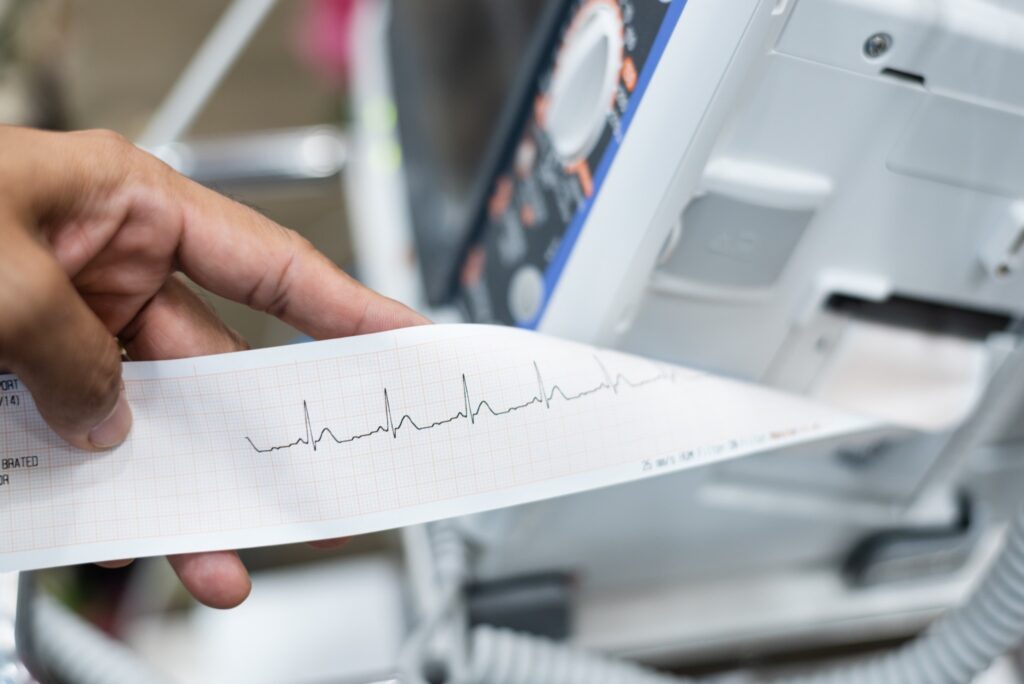At Thibodaux Regional Urgent Care – Houma, we recognize the importance of maintaining a healthy heart and are here for all of your heart-related health needs seven days a week.
Our on-site EKG testing allows us to quickly diagnose and treat any heart-related problems you may be experiencing, urgent or not.
These diagnostic, noninvasive tests are a fast and painless way to check on the health of your heart, especially if you are experiencing a change in your well-being or require a thorough check before major surgery.
If you have chest pain, a fast heartbeat, or difficulty catching your breath, an EKG is the best test to check if what you’re experiencing is directly related to your heart health.
An EKG is also an excellent way for doctors to ensure that your heart is healthy before surgery.
It is important to note that although EKGs are great in-the-moment tests, they also are ideal for checking your heart before a life-changing event, like surgery.
Don’t delay treatment; visit us today for evaluation and diagnosis. The health of your heart is vital.
What Is an EKG?
An electrocardiogram, or EKG, is a simple procedure that checks the overall health of your heart. It works by letting off an electrical signal that can be measured each time your heart beats.
Reviewing the electrical signal allows medical professionals to determine if your heart is beating at an average rate, strength and rhythm.
Any irregular readings can lead to further testing and diagnosis to get to the bottom of your irregularity.
An EKG also shows the size and position of all heart chambers.
What Does an EKG Detect?
During an EKG, readings are printed out for review by your provider, who will check for any indication of
- A rapid or slow heart rate
- Inadequate blood supply
- Signs of a past or present heart attack
- A bulge in the walls of the heart
- Thickening of the heart
- Enlarged heart size
Although these signs don’t always lead to a serious diagnosis, they are a baseline to monitor overall heart health.
In many cases, a positive review of these symptoms can lead to heart-related diagnoses, including
- Arrhythmia
- Coronary artery disease
- Heart disease
- Heart attack
When Do I Need an EKG?
EKGs are performed for various reasons, including the rapid or unsettling onset of symptoms such as
- Chest pain
- Rapid heartbeat
- Dizziness
- Fatigue
- Shortness of breath
- Arrhythmia
You may also require a non-urgent EKG if you
- Have a history of heart attack
- Are living with heart-related conditions
- Have a pacemaker
- Have a family history of heart-related issues
- Are taking heart medications
- Need to check your heart health before surgery
Why Do I Need an EKG Before Major Surgery?
An EKG is often requested before major surgery to ensure your heart is healthy enough to endure the surgery itself. It assesses the likelihood of experiencing a heart-related complication during surgery.
A normal EKG result will allow your surgeon to rule out any heart troubles before surgery.
An irregular EKG could delay your surgery with a new focus on getting to the bottom of your heart-related condition.
It is important to note that an irregular EKG does not always rule out surgery completely. It helps your doctors and surgical team understand your body better.
After receiving an EKG, you always meet with your surgeon to discuss your results and the next steps in your plan in a more personalized manner.
What Is the Procedure Like?
An EKG can be performed at your doctor’s office, emergency room or local urgent care center.
During the procedure, you will lie on a standard exam table. Small sensors known as electrodes will be attached to specific areas of your body, including the chest, back, arms and legs, using a sticky pad.
Once all pads have adhered, they will be connected to electrical wires that transmit your heart readings to a monitor for more in-depth review and monitoring.
Results are printed out as your heart is monitored and thoroughly reviewed during your appointment.
How Long Does an EKG Test Last?
An EKG is fast and painless.
The actual testing time varies by person but is usually no more than 10 minutes if there are no serious concerns or abnormalities to note.
Get Your Heart Checked Before Surgery at Thibodaux Regional Urgent Care – Houma
If you are experiencing symptoms consistent with a heart issue or have been asked to get an EKG before an upcoming surgery, we can help.
At Urgent Care of Houma, no appointment is necessary, and walk-ins are always welcome.
Our experienced team is available seven days a week to provide heart-related screenings, including an EKG for a fast, painless diagnosis. Don’t delay; get your EKG today so you can rule out any heart-related conditions of concern and fully prepare for the next steps in surgery or your health journey.




